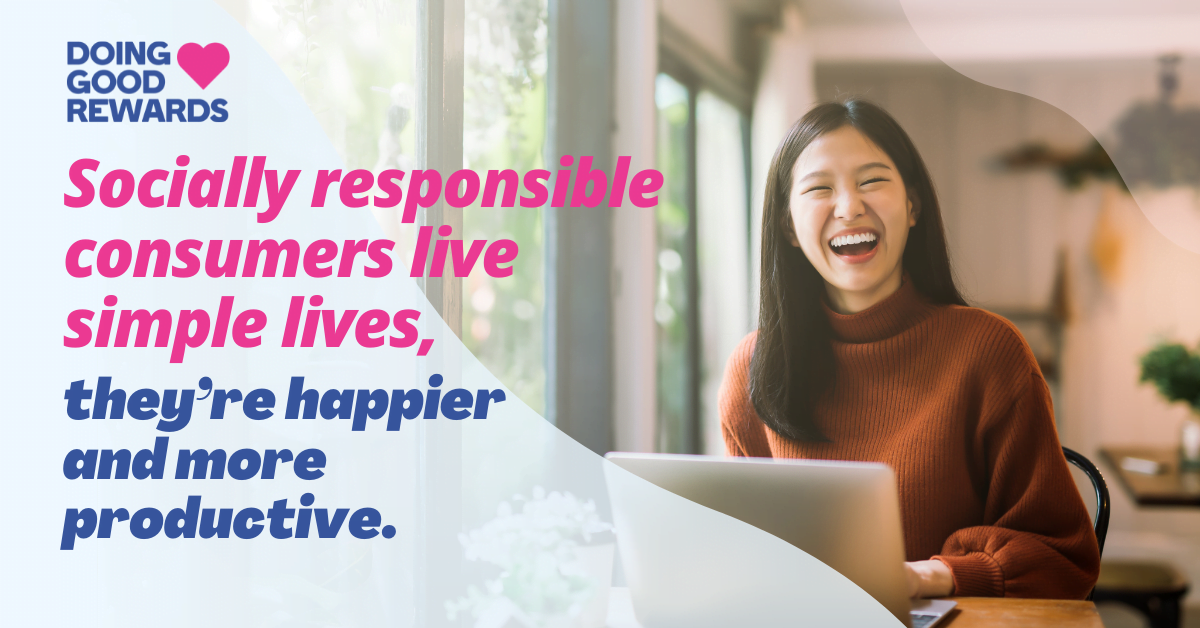
We can all live better lives as socially responsible consumers
Of late, it seems that everything and everyone has reached a tipping point.
Since last month, NSW and VIC have been facing challenges in relation to lockdowns, distress and a natural disaster.
Something else is at the tipping point and while it’s not Godzilla superseding Melbourne’s recent earthquake, it’s the emergence of a quieter but more earth-shaking development: Socially responsible consumerism. This movement holds tremendous potency to change the world through the way we consume things.
It’s ironic as societal issues become more unsustainable, many seek sustainability because it provides positive certainty.
One way to do this is by making conscious decisions through the way we shop. But as an individual, it’s hard to see the impact of our responsible consumerism.
We may think: what does buying fair-trade tea do in the long run? If every single person did this, it would create a ripple effect for long-term social and environmental change.
Socially responsible consumers live simple lives, they’re happier and more productive.
We too can own this state of mind with some of these practical lifestyle habits and choices made by conscious consumers:
Adopt Minimalism and live Zen
Monks don’t have much, but they’re the most peaceful and grounded people on earth. But in our busy lives, it’s hard to avoid commercialism and have things in excess.
It’s no wonder that our country consumes and discards more than average, with 67 million tonnes of waste produced per year and most of it goes straight to landfill.
So before buying something, look at your stuff at home. Do you really need that new item or do you already have something similar and usable?

Before buying something, look at your stuff at home. Do you really need that new item or do you already have something similar and usable?
We love the novelty of buying something even if pre-loved and sustainably made. But oftentimes, new things are unnecessary, especially if they’re bought on impulse (something many of us are guilty of even with the best intentions!)
There are Minimalist Movements that encourage us to buy less and save more. If each one of us lives minimally, we can eventually reduce excess waste and its harm to the environment.
Living with fewer things also means less clutter which contributes to our wellbeing and gives us mental clarity. One for the earth, and one for us!
Travel less
This is obviously not a difficult feat, seeing that travel in all forms has been restricted.
Interestingly, less movement from lockdowns has reduced fossil fuel consumption worldwide. Many nations have found significant reductions in greenhouse gas emissions in 2020, hence a lesser carbon footprint.
While the Humanities and Social Sciences Communications says that this reduction may be insignificant to contribute to long-term global sustainability efforts, it’s encouraging to see that we can create a notable difference in the way we travel.
So, when travel is back to normal again, we can continue to reduce environmental damage by choosing rideshares, public transport, bicycles or investing in an electric vehicle (less energy output – we’ll explain in a different article).
The more immediate advantage for us is that it’ll cost less, we’d get more exercise by default so that helps our finances and health.
Reuse, Recycle, Reduce and Refuse
There’s something satisfying about reusing something again for as long as it lasts. It’s great that supermarkets and some cafes have banned plastic bags and disposable cups. But let’s admit that we often forget our reusable bags and can still buy more for cheap at the checkout which defeats the purpose.
Make a conscious effort to have plenty of reusable bags, utensils and containers handy so that you can constantly reuse them and refuse anything extra.
If you want a challenge, try fixing broken items before buying new ones or look for community-run workshops that teach you how to give your goods another chance. Start composting organic waste at home and create a mini garden – give back to nature that’ll give back better soil to you.

Try fixing broken items before buying new ones or look for community-run workshops that teach you how to give your goods another chance.
For other things that we need, look at borrowing them from friends and family or shop at flea markets or online marketplaces (gumtree or Facebook Marketplace).
You’re not only being responsible, but it gives you a deep sense of fulfilment and purpose when making the extra effort to ensure that there’s less unnecessary wastage.
Go ethical
It’s true that most fair-trade and ethically made products cost more but that little bit extra goes to improving local communities and work conditions via educational programs, training and development.
Fair-trade products are generally produced with more care and with less or no chemicals than the typical “fast-moving consumer goods” go through.
This results in better quality, longer-lasting and nicer tasting products for consumers.
For example, when you choose organic fair-trade coffee, you’ll be enjoying a beverage produced from beans that’s been sustainability grown to preserve their complex and rich flavours without the use of harsh chemicals.
For everyday items like personal care and toiletries, buying from local companies like Thank You and Who Gives a Crap supports their missions to give communities access to basic needs like sanitisation and better workplace practices.
Every small step counts as we embark on our journey to living our lives as socially responsible consumers.
While lockdowns have been challenging, the hardships have triggered our innate desire to be everyday heroes where we can make a positive difference for ourselves and future generations.
Want to receive exclusive discounts while supporting your favourite businesses and automatically help fund your charity of choice?
Download the Doing Good Rewards app here and get set up to shop in less than 2 minutes!
Recent Posts
- 4 Tips For Communicating Your Social Impact
- Changemaker Consumers: 2023 Trends All Brands Need to Know
- Put your holiday spending to great use this holiday season!
- Stop just giving money to charity and go ‘full CSR’ with purpose
- The right way to promote and profit from your Corporate Social Responsibility credentials
Categories
Click here to email us & we’ll contact you to send more info
Click here to book a 15 min Zoom meeting to find out more
What would you like to do?

Stay ahead of the trends and the competition
Download Free PDF
